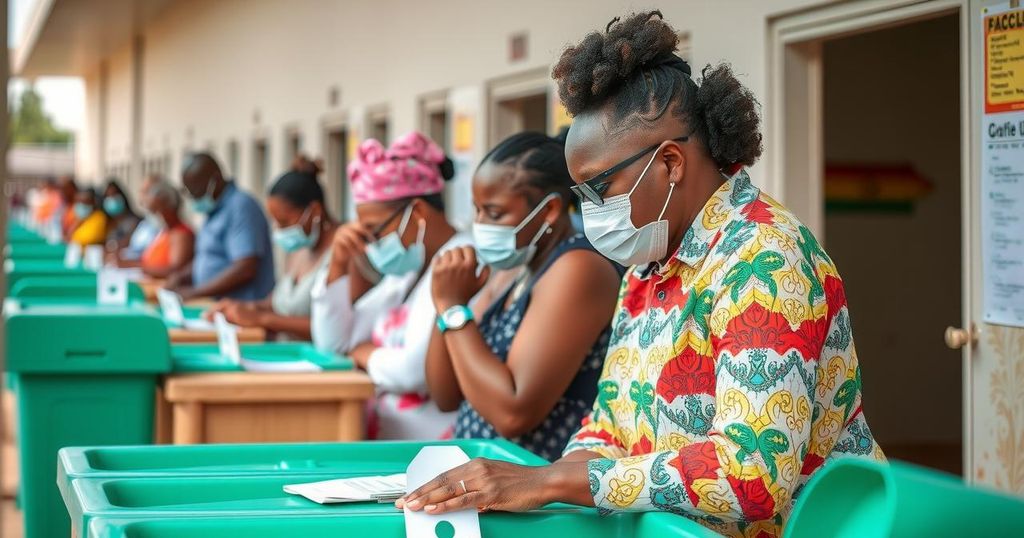Ghana Elections: A Test of Democracy Amid Economic Crisis

Ghana held presidential and legislative elections amidst a severe economic crisis, where 18.7 million voters participated. The election is primarily contested between Vice President Mahamudu Bawumia and former President JohnDramani Mahama. Both candidates seek to address the country’s economic challenges, but public sentiment indicates widespread skepticism about their proposed solutions. Amidst ongoing illegal mining issues and high inflation, the upcoming elections could define the future of Ghana’s democracy and economy.
On Saturday, Ghana initiated its presidential and legislative elections, a crucial moment for the nation, often regarded as a model of democratic governance in a region shaken by coups and violence. An estimated 18.7 million Ghanaians are eligible to vote amidst a significant economic crisis marked by skyrocketing inflation and unemployment, which looms heavily over this electoral process. Despite the presence of 12 candidates, the contest predominantly features a face-off between Vice President Mahamudu Bawumia of the ruling New Patriotic Party (NPP) and former President John Dramani Mahama of the opposition National Democratic Congress (NDC), both of whom face skepticism regarding their proposed solutions to the economic crisis.
Historically, Ghana has been celebrated for its commitment to democratic values, characterized by successful multiparty elections since 1992. However, the current economic challenges have led to disillusionment among voters, with recent surveys indicating that 82% believe the country is on the wrong track. The political landscape is starkly divided, with both primary candidates offering similar approaches to governance and economic recovery.
During their final campaign speeches, Mr. Bawumia, an economist educated at Oxford, reiterated promises to build upon the efforts of the current administration to bring economic stability. Conversely, Mr. Mahama, emphasizing the need for a comprehensive overhaul, declared, “We need to reset our democracy, governance, economy, finances, agriculture, infrastructure, environment, health sector and all that we hold dear as a people.”
Though the atmosphere is filled with energetic political rallies, the general populace remains deeply concerned about the direction of the economy. With Ghana having defaulted on much of its foreign debt last year, the inflation rate soared to an alarming 54%, creating difficult conditions for citizens who may not yet feel the benefits of any economic improvements.
Moreover, the rampant illegal mining, locally referred to as galamsey, adds another layer of complexity to the elections. As Ghana ranks as Africa’s leading gold producer, the illegal mining practices have led to widespread environmental degradation and significant public outcry against the ruling government’s inability to effectively address these issues. Thus, the upcoming elections are as much about the restoration of political stability as they are about economic viability.
Ghana, once hailed as a beacon of democracy in West Africa, has found itself grappling with an unprecedented economic crisis that has overshadowed its political landscape. Following years of relative stability and prosperity, the country now faces challenges including high inflation, unemployment, and issues related to illegal mining. With a democratic history since the early 1990s, the upcoming elections are pivotal in determining the future trajectory of both governance and economic reform in a country that has seen increasing public frustration with its leadership.
In summary, the Ghanaian elections represent a critical juncture for the nation, where the choices made by its electorate may significantly reshape the political and economic landscape. As both leading candidates aim to address the ongoing economic challenges, the electorate’s discontent suggests that mere promises may not be sufficient to restore trust and stability. The outcome of this election will therefore serve as a defining moment for Ghana’s democracy and its economic future.
Original Source: www.voanews.com








